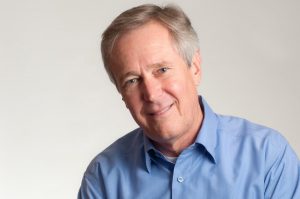
James Fallows understands America.
After visiting and reporting on dozens of small towns and cities all across the country, he’s witnessed first-hand both the trials and triumphs of communities that tend to be overlooked by traditional news media.
And he understands that the ticking, whirring gears that come together to make up the country’s unique social and political landscape are wound tight.
At 2 p.m. Monday, July 1 in the Hall of Philosophy, Fallows, a national correspondent for The Atlantic and co-founder of the publication’s American Futures project, will begin Week Two of Chautauqua’s Interfaith Lecture Series with “Is Common Good a Lost Cause? Sources of Strain, and Re-Connection, in Modern America.” The lecture is one part of the Week Two interfaith theme, “Common Good Change Agents.” All this week, Fallows will be in conversation with people making changes in their own communities, including with Judy Shepard on Tuesday; Chuck Yarborough on Wednesday; and Emily and Stuart Siegel on Thursday.
In addition to writing for The Atlantic since the late 1970s, Fallows’ work has appeared in The New Yorker, The New York Times Magazine, The New York Review of Books and Slate Magazine, among others.
“Truly, in the decades that I’ve worked for The Atlantic, the question for me has been: Is America going to make it?” Fallows asked.
The answer to that question sent him and his wife Deborah — a writer and fellow at New America, a nonpartisan think tank — on a roughly four-year plane trip to smaller towns and cities throughout the United States.
“I think for me, the biggest takeaway from the project was how much is going on at the local level,” Deborah Fallows said. “What we thought was unusual or remarkable at the beginning, at the first town or so, eventually became an expectation of some version of the same.”
She said she also was surprised that public libraries across the country had changed into “the heartbeat of the communities.”
“When we were growing up, the library was just a place to get books,” Deborah Fallows said. “Now, it’s a core institution of the communities. They’re filling in the gaps that towns discover and speaking to the wants and the needs of the community, whether it’s education or access to technology or civic and social questions that need addressing.”
Fallows said the impetus for American Futures originated after he returned from China, where he was reporting internationally for The Atlantic.
“We moved back from China in 2011,” Fallows said. “In China, my wife and I had mainly been (reporting) in small towns. We felt as if it was time to apply the same perspective we had there, here.”
Instead of asking small town residents their views on national politics, Fallows said their strategy for American Futures was to instead ask about local issues that weren’t as likely to be polarizing.
“In everything we do as journalists, we try to convey things we have seen that might be of interest to people, things that we think might be new,” he said.
The decision to start the American Futures project, according to Fallows, was “part intent, but mainly an accident.”
“It was supposed to last two months, but ended up turning into four years,” he said.
Fallows said his goal for his lecture is to give people a “tangible, realistic and optimistic sense of what can be done in this country.”




